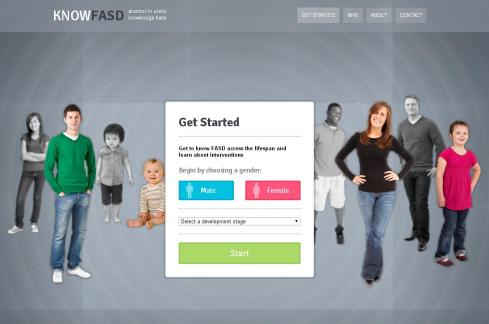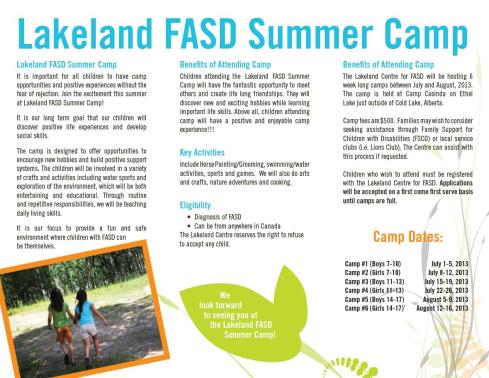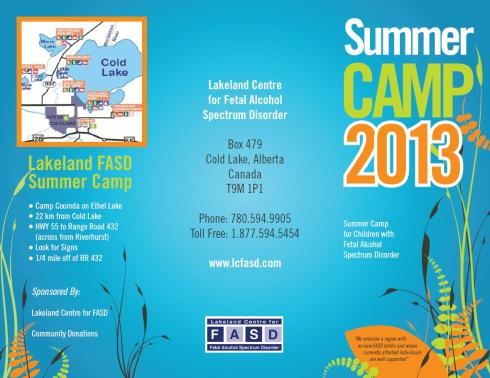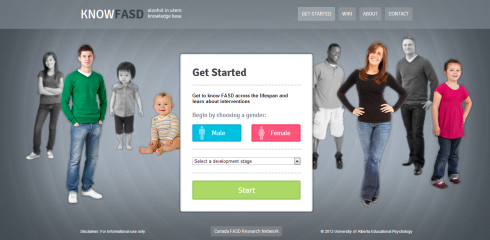You are currently browsing the category archive for the ‘Social Skills’ category.
Category Archive
Now Recruiting: Virtual Environment Social and Cognitive Skills Intervention for Adolescents with FASD or PAE
October 19, 2016 in Academics, Education, fasd, Living with FASD, Resources, Social Skills, University of Alberta | Leave a comment
Did you ever think adolescents with FASD or PAE could practice social and cognitive skills in a virtual environment?
Rianne Spaans is a third-year doctoral student in the School and Clinical Child Psychology program at the University of Alberta thought so! Rianne, under the supervision of Dr. Jacqueline Pei and in collaboration with the “programming geniuses” at Technology in Education Specialization in the faculty of education at the University of Alberta are working to develop and test the effectiveness of a virtual environment intervention that targets social and cognitive skills for adolescents aged 13-18 with fetal alcohol spectrum disorder (FASD) or prenatal alcohol exposure (PAE).
This unique and engaging intervention takes place in a virtual environment, or what Rianne calls a “fancy video game.” The style of the game is mission impossible, where players interact online to solve the crime. Different social and cognitive skills are targeted by the types of games played or tasks completed. Such tasks progress in difficulty, starting off easy and becoming more difficult as the game continues.
Rianne explained one of the games “Car Thief,” that takes place in a chop shop where a team of 5 players works together to catch the bad guy that steals cars. The evidence they find in this particular game takes players through different scenarios such as avoiding guard dogs, disarming cameras and examining documents to find relevant names as clues to solve the case.
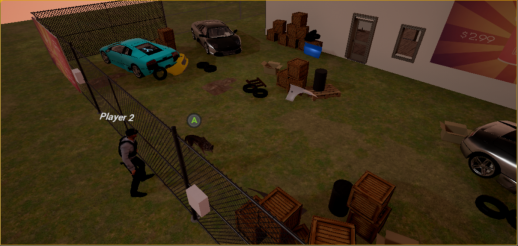
Image from Virtual Environment “Car Thief” game, players distracting guard dogs.
Teams of players that work well together catch the bad guy. However, this is not without working on skills such as emotional regulation or attention span. 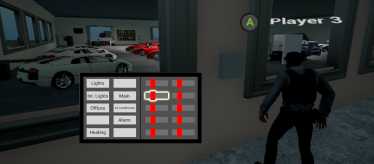 Some games, for example, are designed to induce frustration or distract players from the task at hand by decoys depending on how the team of players works together.
Some games, for example, are designed to induce frustration or distract players from the task at hand by decoys depending on how the team of players works together.
There are also features like a “chill out space” where if players do become frustrated they can take a break.
To top it all off, this virtual environment was entirely developed from scratch, from the storyline and characters to the game programming!
Rianne pointed out that there is a need for interventions that engage adolescents stating “It is understandable why they [adolescents] are not wanting to stay in some intervention programs… most programs are boring.” They are just simply not targeting adolescents interests. Rianne is hoping that this project will expand the kinds of interventions out there for adolescents to include virtual environments. As well as to “jump start the development of interventions that are fun and engaging.”
The study discussed in this blog is titled “Social Skills Intervention for Adolescents: the use of a virtual environment” and is currently adolescents aged 13 up to 18 years old with a diagnosis of FASD or PAE (suspected FASD) recruiting out of the Univeristy of Alberta located in Edmonton.
If you would like more information or to participate in this study, please contact Rianne Spaans at spaans@ualberta.ca
See below for more images from the virtual environment intervention!
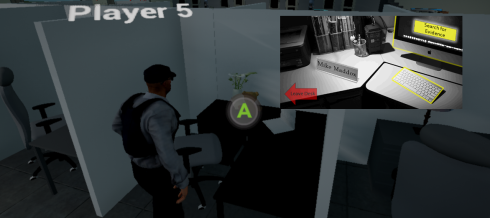
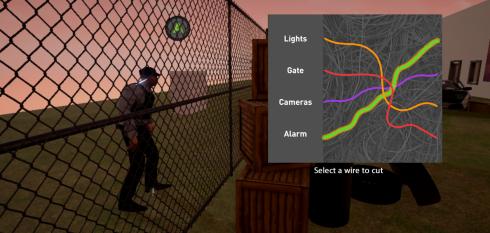

KnowFASD is Back! Learn about FASD and Get Help!
May 26, 2015 in Academics, Addictions, Adoption, Adoption/Foster Care, Adult Interventions, Attention/Hyperactivity, Behavioural Interventions, Caregiver Needs, Communication, Criminal Justice, Daily Living Skills, Education, Executive function, Feeding/Eating, Impulsivity/Risk Taking, Language, Math, Memory, Mental Health, Money, Motor/Visual-motor, Resources, secondary disabilites, Self Regulation, Sensory/Motor, Sexuality, Sleep, Social Skills, Tips, Transition Planning, Trauma | Tags: fasd, KnowFASD | 3 comments
After what seems like far too long, KnowFASD is back in operation! To those of you who use the site regularly and have been waiting for its return, thank you for your patience.
If you have never visited the site, please feel free to drop by and check it out! Take a browse through the interactive home page and learn more/find help on the site’s wiki.
Our goal with KnowFASD is to provide a comprehensive site where viewers can learn about the neurobehavioural deficits associated with FASD throughout the lifespan and link to intervention options.
The main homepage of the website is an interactive interface where viewers can scroll through the lifespan of individuals with FASD, with neurobehavioural issues at each developmental stage presented as they may appear in day-to-day life. By clicking on a neurobehavioural issue, viewers are directed to a “wiki” (which works in a similar fashion to Wikipedia) housing information from current research on the neurobehavioural issue at hand. Each wiki page discusses a specific neurobehavioural issue: how it presents, potential causes, and potential consequences. At the bottom of each page, a link is provided to topic-specific intervention options.
Please feel free to visit the site, pass it along, and give us your feedback or suggestions. Check back often as we continue to upload information, links, and resources.
Some Great Programs from MOFAS
July 18, 2013 in Sexuality, Social Skills, Support Groups | Leave a comment
Minnesota Organization on Fetal Alcohol Syndrome (MOFAS), an American organization addressing the needs of individuals with FASD and their families and caregivers, is well versed in support programs for those with FASD.

In the past, we have posted about their support groups for adults with FASD.
Currently, MOFAS is running several great programs, such as:
Growing up Class: Just for Boys
A class to support boys through the physical, emotional, and social changes that occur during puberty.
Funding the Metro Crisis Coordination Programs
Includes training and support groups for family, caregivers, and educators of individuals with FASD as well as social skills groups for individuals with FASD.
“Creating Your Family Portrait”
An art program where teens with FASD and their caregivers work together to create family portraits through supportive art processes.
MOFAS is also offering several retreats throughout the summer:
MOFAS Summer Family Retreat 2013- Brainerd
MOFAS Summer Family Retreat 2013- Stewartville
Birth/Kinship Family Retreat 2013
For our readers:
Do you know of another great current or upcoming program that we haven’t covered? Please leave a comment to share it with other readers!
Highlighting Lakeland FASD Summer Camp, Cold Lake, Alberta
May 8, 2013 in Daily Living Skills, Kids Programs/Camps, Social Skills | Tags: fasd, summer camp | Leave a comment
The warmer weather and the end of the school year looming on the horizon must have parents thinking about summer plans. I’ve noticed more than a few “special needs summer camps” search terms leading people to the blog. (Yup, that’s right, WordPress shows us which search terms our readers use to find us! We use your search terms to help guide the content of our posts).
We’ve contacted the good folks at Lakeland Centre for FASD, home of one of Canada’s only FASD-specific summer camps, in order to give you camp information as soon as it is available. The Lakeland website will soon be updated, and they have been kind enough to share their brochures with us for distribution in the meantime.
Click on the image below for camp information including activities, eligibility, cost and dates:
Click on the image below for camp location and contact information:
Click here to access last year’s feature on special needs summer camps and stay tuned for more updates on 2013 special needs summer camps!
Introducing KnowFASD: The iNAT’s interactive information and intervention website.
April 2, 2013 in Academics, Addictions, Adult Interventions, Attention/Hyperactivity, Behavioural Interventions, Communication, Criminal Justice, Daily Living Skills, Education, Executive function, Feeding/Eating, Language, Living with FASD, Memory, Motor/Visual-motor, Resources, secondary disabilites, Self Regulation, Sensory/Motor, Sleep, Social Skills, Support Groups, Tips | 1 comment
We recently featured our newest project, KnowFASD, in the latest edition of our iNAT newsletter. For those of you who have not yet subscribed to the iNAT newsletter, here is some information about KnowFASD:
Our goal with KnowFASD is to provide a comprehensive site where viewers can learn about the neurobehavioural deficits associated with FASD throughout the lifespan and link to intervention options.
The main homepage of the website is an interactive interface where viewers can scroll through the lifespan of individuals with FASD, with neurobehavioural issues at each developmental stage presented as they may appear in day-to-day life. By clicking on a neurobehavioural issue, viewers are directed to a “wiki” (which works in a similar fashion to Wikipedia) housing information from current research on the neurobehavioural issue at hand. Each wiki page discusses a specific neurobehavioural issue: how it presents, potential causes, and potential consequences. At the bottom of each page, a link is provided to topic-specific intervention options.
Please feel free to visit the site, pass it along, and give us your feedback or suggestions. Check back often as we continue to categorize and upload information.
Supports for Adults with FASD
February 6, 2013 in Adult Interventions, Communication, Daily Living Skills, Living with FASD, Research, Resources, Social Skills | Leave a comment
In my search for intervention information for this blog, I come across many strategies and research studies aimed at children and youth with FASD, which is wonderful. Early intervention and lots of it is a great thing. However, the reality of the situation is that fetal alcohol spectrum disorders do not disappear with time. If you have an FASD as a child, you continue to have it as an adult.
Research by Streissguth et. al.1 shows that adolescents and adults with fetal alcohol spectrum disorders function academically at an early grade school level. Their average adaptive functioning level (i.e. daily living skills, socialization skills, communication skills) is at the level of a typically developing 7 year old. Sixty two percent of adolescents and adults with FASD showed significant maladaptive behaviours, such as poor attention and concentration, teasing/bullying, crying or laughing too easily, dependency, stubbornness, social withdrawal, impulsivity, anxiety, and sullenness).
In another study on young adults with FASD2, the secondary disabilities associated with FASD (such as disrupted school experience, difficulties in the workplace, trouble with the law,and difficulty living independently) are very apparent in adulthood. Approximately half of the participants had needed special education, with only 38% having passed primary school and only 13% having passed high school. Despite a majority of participants having received some sort of job training/preparation, only 13% of participants had ever been employed in a regular job. Only 30% of participants in this study were either living independently or with a partner/family of their own. The remaining 60% were institutionalized or in a dependent-living situation.
Given that we often find that adults with FASD function at the level of school-aged children, ideally they should be provided with the same amount of support we would give to a child. However, this is not always the case. According to the Canadian Child Welfare Research Portal, children with disabilities in Canada receive child welfare protection until the age of 19. In addition to this, many individuals with prenatal alcohol exposure do not receive an FASD diagnosis (but still experience neurobehavioural issues and difficulties with daily living), meaning that without a diagnosis they might be cut off from child protective services at an earlier age (children and youth without disabilities in the child welfare system are eligible for child protective services until age 16-19, depending on the province).
Becoming an adult, leaving the school system, and no longer receiving child welfare services can be a huge loss of consistency and support.
All of this begs the question: What are we doing to support adults with FASD?
In a recent article from the Sudbury Star entitled “We’re just different”, Matthew Pakozdy, a young adult with FASD, speaks about the difficulties and successes of living with FASD.
The take home message from this article? supports are needed for children and adults alike with FASD, and the right supports can make a difference. Pakozdy credits a supportive mother, reliable caregivers/advocates, support staff and friends for the positive changes he has made in his life.
A few other things mentioned in the article as essential supports for individuals with FASD are a permanent cellphone with easily accessible emergency phone numbers, regular income, housing alternatives, and help to foster emotional control and healthy relationships.
With increased awareness and research about FASD, organizations are jumping on board to support adults with FASD:
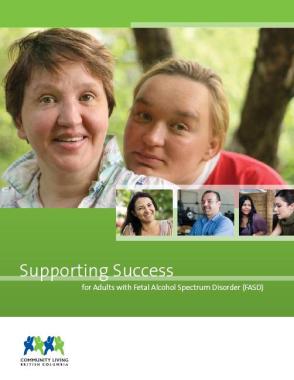 Check out Community Living British Columbia‘s “Supporting Success for Adults with FASD”, an online resource for those who work with adults with FASD
Check out Community Living British Columbia‘s “Supporting Success for Adults with FASD”, an online resource for those who work with adults with FASD
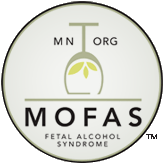 The Minnesota Organization on Fetal Alcohol Syndrome (MOFAS) holds a support group for adults affected by an FASD every Monday until April 2, 2013 in Saint Paul, MN.
The Minnesota Organization on Fetal Alcohol Syndrome (MOFAS) holds a support group for adults affected by an FASD every Monday until April 2, 2013 in Saint Paul, MN.
For other posts about adult interventions, see our archived articles under Adult Interventions.
For our readers: Know of an organization that helps adults with FASD? Share it here or send us an email so we can spread the word!
References:
1. Streissguth, A.P., et al., Fetal Alcohol Syndrome in adolescents and adults. The Journal of the American Medical Association, 1991. 265: p. 1961-1967.
2. Spohr, H.-L., J. Willms, and H. Steinhausen, Fetal Alcohol Spectrum Disorders in young adulthood. The Journal of Pediatrics, 2007. 150(2): p. 175-179.e1.
A Great Online Resource for Kids with Special Needs
June 7, 2012 in Academics, Adult Interventions, Behavioural Interventions, Communication, Daily Living Skills, Resources, Self Regulation, Social Skills, Tips | 2 comments
The Do2Learn website is a fantastic site if you are looking for ways to practice learning at home or if you are looking for resources to pass along to educators, caregivers, service providers, and more!
Although the site is not specific to FASD, the resources target some of the toughest areas for individuals with FASD, such as academics, social skills, behaviour management, communication, and daily living skills. The pages have great ideas for activities in home, community, and classroom settings.
Academics
Difficulties in academic subjects such as reading, spelling, and math are common for individuals with FASD. These difficulties often become worse as the individual gets older, so early intervention is very important. The academics section on the Do2Learn site includes activities to promote the development of many academic skills. Topics include:
- Fine motor skills
- Language
- Visual discrimination
- Literacy
- Math
- Learning Strategies
Social Skills
Many aspects of social functioning are difficult for people with FASD. They may have trouble with getting along with others, making and keeping friends, understanding feelings and emotions, and acting appropriately in social situations. Just like academics, social difficulties can become more of a problem as the individual with FASD enters adolescence and adulthood. The social skills section on the website includes many activities to work on social functioning. Topics include:
- Communication skills
- Social behaviour
- Social skills toolbox
- Emotions colour wheel
- Social emotional skills
Go to the social skills section
Behaviour management
Individuals with FASD often have behaviour difficulties. Some of these behaviour difficulties may show up as defiance, acting out, temper tantrums, aggression, stealing, etc. It is important to remember that these behaviours are usually not intentional. Negative behaviours often occur secondary to other difficulties, such as environmental stresses, lack of understanding, poor cognitive ability, or unreasonable expectations. The Do2Learn website keeps this in mind with suggestions for:
- Classroom strategies to promote good behaviour and accommodate students with special needs
- Resources to help understand and deal with the underlying causes of behaviour
- Behaviour management strategies
Go to the behaviour management section
For Adolescents and Adults:
There is also a great “jobTIPS” resource for older adolescents and adults looking to get involved in the work force. JobTIPS takes the individual through a user-friendly job-planning process with step by step instructions, tips, and resources. Featured topics include:
- Determining Interests: The client discovers what their interests and strengths are and what they need to work on (i.e. social skills)
- Finding a Job: Different ways to look for work
- Getting a Job: How to navigate the application and interview process
- Keeping a Job: Keeping up with workplace expectations and how to behave in a work setting
- Other Job Topics: Such as how to leave employment, legal rights in the workplace, etc.
For our readers:
Is there a resource on the Do2Learn website you have found particularly helpful? Leave a comment and share it here!
What other sites/resources have you found helpful?
References:
Kodituwakku, P. W. (2007) Defining the behavioral phenotype in children with fetal alcohol spectrum disorders: a review. Neuroscience and Biobehavioral Reviews, 31, 192-201.
Kodituwakku, P. W. (2009) Neurocognitive profile in children with fetal alcohol spectrum disorders. Developmental Disabilities, 15, 218-224.
Mattson, S. N., Crocker, N., & Nguyen, T. T. (2011). Fetal alcohol spectrum disorders: neuropsychological and behavioral features. Neuropsychology Review, 21, 81-101.
McGee, C.L., & Riley, E.P. (2007). Social and behavioral functioning in individuals with prenatal alcohol exposure. International Journal on Disability and Human Development, 6(4), 369-382.
Rasmussen, C. & Wyper, K. (2007). Decision making, executive functioning, and risky behaviours in adolescents with prenatal alcohol exposure. International Journal on Disability and Human Development, 6(4), 405-416.
Math and Social Skills Intervention in the Edmonton Area
April 18, 2012 in Alberta, Math, Research, Social Skills | 1 comment
Do you live in the Edmonton, AB area?
Do you have a child between the ages of 4 and 10 with an FASD diagnosis?
The University of Alberta is conducting an intervention study for children with FASD. Children who are eligible for the study will be randomly assigned to either a math intervention or a social skills intervention.
Please read the Information Poster to learn more.
Have questions?
Email labfasd@gmail.com or call (780) 735-7999 ext. 15631 for more information or to see if your child is eligible

